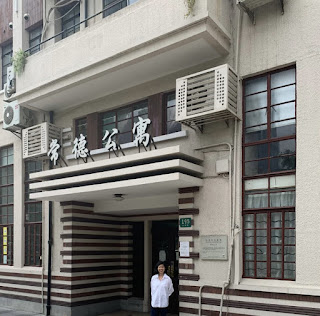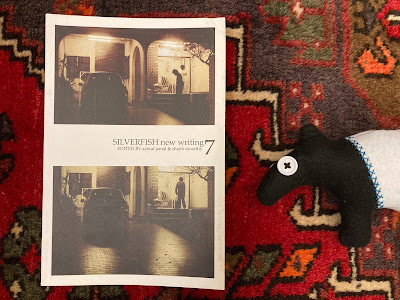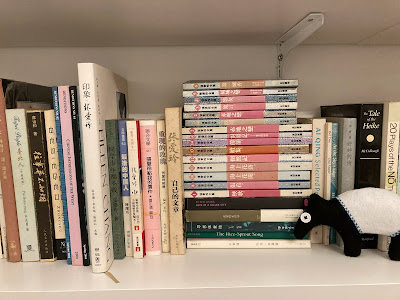“It’s the tree ghost. Your mother must have done something to offend it. Now that she’s gone, the tree ghost is finally appeased,” Grandaunt M postulated. Miss Jumi Lim had ventured this challenge: “Lao Yi, if this is so, why did the tree ghost now take the papayas back?” Grandaunt M’s retort came swiftly. “Well, it’s obvious you must be your mother’s daughter… Offending it so soon after you move into your mother's house!”
Her Aunt Q had whispered this variation instead: "Since it is only your mother’s ghost, Jumi, there’s no need for you to be afraid…But then again, we don’t know anything for sure – ” She added this last bit loudly, just in case Jumi’s mother, recently deceased, resented being found out and labelled a papaya thief in the afterlife.
Jumi Lim froze. Is this really the spirit of the famed writer Zhang Ailing? Or is this some prank? Or worse, is this an evil spirit? She looks harmless, no? What does she want? Has my mother sent her? Could it have been her who stole the papayas? These questions mounted each other, producing yet more questions, their energies gathering life in her body, until Jumi sneezed – releasing them into the night air.
*
Zhang Ailing was a thin woman with lanky limbs, so skinny her eyes bulged from her face. In her photographs she seldom smiled. And when she did, you would think it was only out of derision for the photographer or an imaginary audience. Her images often cast that shadow of mystery. It was perhaps because the bulk of her writings were produced in a short span of 3 years in 1940s Shanghai and after her long voluntary exile in America, no new works came from her. In that impenetrable absence, her fame and legend grew. But asleep – or rather, dead – Zhang Ailing looked less formidable. Her skin hugged her skull, but her mouth was slightly open, her jaw were slack. Hers was a defenseless face.
Madam Kwek Kim Eng, on the other hand, was a Chinese language teacher in an unremarkable school, and remained one for as long as the Department of Education allowed. While generations of students may remember her with fondness or trepidation, she was not entitled to any public fame. Her body was short and anchored with firm heavy limbs. Even her eyelids were so weighed down in her old age that her eyes seemed to have disappeared into her skull. Her wide face held no secrets – the slightest of smiles brought dimples, and anger was a terrifying scowl with broken teeth. Yet Jumi remembered how Mdm Kwek Kim Eng’s face as she lay in the casket was a blank and impassable mask. Her mother would certainly have made a scarier ghost.
It was Jumi who had first discovered Mdm Kwek’s dead body. It was a Sunday afternoon. Every Sunday, Jumi would arrive at Mdm Kwek’s house at about four, just before the sun was started to give up the day. She would stay to help Mdm Kwek prepare a simple dinner. Such was the routine even when her father was alive. That afternoon, as Jumi Lim stepped into the house through the gate for her weekly visit, she saw her mother seated on the low step on the porch instead of her usual place on the living room couch. Her body was leaning against the tiled pillar and her hair was slightly disheveled. Jumi had called out to her mother at the gate. From a distance, other than for the grayish tint of her skin and the slightly deflated look of her limbs, she had appeared no different from when she would doze off on the couch. The coroners told Jumi her mother had already died the night before of a heart attack. So for maybe sixteen or more hours, Mdm Kwek’s dead body had sat under the open sky.
After ten minutes of silence between them on the couch, Zhang Ailing spoke again. “This TV show is not bad.”
Wife: Are you okay?
Sam: Go away.
Sam: Go away.
Wife: Do you want (me to get) a warm towel?
Sam: Go away. Stop bothering me.
Wife: A cup of tea?
Their exchanges would often end here for Sam would proceed to sweep whatever was on the coffee table onto the floor. This would mean that the understanding wife would start to cry, which the dubbing woman did very convincingly.
“You did?” Zhang Ailing leaned forward to open the box, and chose a slice of strawberry mousse cake, topped with two twirls of white chocolate and a dark chocolate button. “I especially like ‘noisy woman’.”
“Noisy woman” was Jumi’s trademark phrase, and the legendary writer Zhang Ailing had noticed it! She remembered years ago the Subtitle Section had held a series of meetings with the Public Affairs Department about the subtitling of quarrels and the use of “rough language”. The Public Affairs Department had said that “Bitch” was not allowed, much less the ruder local variations. In the guide which that Department had distributed to all subtitlers, the alternatives suggested never seemed to quite measure up: “Stop nagging”; “Leave me alone”; “Stop talking”; and “Shut Up” (which involved considerable debate since most of the dramas were shown at dinnertime. “Too harsh, don’t you think, not good for the children?” the Deputy Director of Public Affiairs had said.) Finally, since most audiences would subscribe readily to the idea of women being noisy, it was agreed that “noisy woman” would raise no controversy. Soon, “noisy woman” was recognized as Jumi’s unique contribution to the media industry. Even Sam’s wife, that Confucian paragon of irrational servitude, could be conceivably noisy to audiences. Why, Jumi sometimes asked herself, did she perpetuate this seeming denigrating and inaccurate picture of women, her own misunderstood kind? But of course, the answer lay not with her; she was only the translator of more pernicious visions. The shy smiles, the tortured turn of the head, the slightly bewildered gaze, the lowering of the eyelids, and that frightened half-step backwards in the face of violent moods (the trembling hand held against the trembling, though hidden, lips) – these contrived displays of subtle body parts in place of those that were grudgingly concealed on national television then. Pernicious. But things were different now. For one, the Public Affairs Department was no longer around. It was replaced by the trendier sounding Marketing, Content and Regulations Department.
“Frankly, I don’t know.”
“Why wouldn’t you know? Isn’t she your mother?”
“Well, we don’t live together and – ”
“So did your mother and I die at the same time?”
“No, no – she died only about five months ago.”
“Was she a good person? Did she die happily?” Zhang Ailing persisted.
“Well, she was as good as most people are. Not any worse. She was a teacher, and I guess that is a fairly noble job – ”
“Noble?” Zhang Ailing interrupted and returned the empty foil wrapper for the tart to the box. “I guess a teacher would be nobler than both of us, a writer’s ghost, and you a subtitler, a ghost writer. Mere ventriloquists.” Zhang smiled at her own witticism. “Your father, did he die a long time before your mother did?”
Zhang Ailing stood up and moved to the glass door. She looked out into the garden. “I wonder what was the last thing your mother saw, sitting alone out there facing the garden.”
And because Jumi had often asked herself the same question these past five months, she soon forgot about speaking to Zhang Ailing about the papayas.
*
Dear Ms Zhang,
Good morning. I have left some pandan cake on the kitchen table. It is a very light, green-coloured, coconut-flavoured chiffon cake. A local favourite. You wouldn’t have tasted something like this in Shanghai or America. I hope you like it.
Last night I had many questions that I wanted to ask you. I think it would be easier for me to write it down like this instead. I am sure you understand this bias for writing. But let me first explain.
After my mother died, the two papaya trees in the front of this house started to bear fruit. This was odd as I remember my father had told us that he had made a mistake and both trees he bought were “female”. I don’t quite understand myself how it is that trees have gender. But what my father meant to say was that it was almost impossible for them to bear fruit without a male papaya tree very nearby. My father was quite the botanist. He was convinced that our two “female” papaya trees would “change their sex”, because papaya trees supposedly would. But ours never did. I am afraid my botany is not sufficient to explain this properly.
But the trees did bear fruit soon after my mother died. And when the papayas were almost ripe, they suddenly disappeared. As you can see, the trees are terribly tall, so it is hard for anyone to steal them.
I am not normally superstitious, but many people have suggested that something supernatural was behind these two occurrences.
Some other things have happened recently in my life; my mother’s death was only one such. So I think I may not be thinking too clearly, and I cannot trust my own conjectures. I know a legendary writer like you must have your reasons for whatever it is that you do. So please forgive me if this question strikes you as somewhat strange: Do you have anything to do with the papayas?
I really have no idea why I must have the answer to this question, especially when there are so many other questions which may be more pressing, like how have you come all the way to this country, and why? In fact, are you really a ghost, or am I going mad? However, if you must answer only one question, it is the one about the papayas that interests me most. The rest, as I have said, you must have your reasons for not revealing.
Yours most truly,
Jumi
*
Dear Jumi,
Unfortunately, I don’t have anything to do with the papayas. The missing ones, I presume?
I was intending to leave today. But after reading your note, I have decided I would stay here until I have solved the mystery of the missing papayas with you. It is too difficult to refuse a mystery – this, if you will, is what a “legendary writer” cannot deny.
As for the other questions that you have also asked– I will only answer them if you will take me out to tea. I wish to see your city.
Ailing
*
It was a Sunday afternoon when Jumi and Zhang Ailing planned a trip to town. Jumi was sure no one would notice Zhang Ailing in this country. The writer’s ghost and her, they would be like any shrivelled old woman with her middle-aged daughter out shopping. However, Zhang Ailing, who was looking through Jumi mother’s wardrobe for something to change into for their afternoon trip, had come away disappointed.
“Jumi,” this was probably the first and only time Jumi remembered the writer’s ghost referring to her by name, “I believe it was you who had summoned me. And even if I could, I would not go back to Shanghai.” She looked at Jumi with those strangely bulging yet narrow eyes and added, “Principles are generally tiresome. But I’ve always held this one principle that whatever we have decided to leave behind – places or people – it is best to resist all temptation of re-visiting them.”
*
“Don’t worry, it will be difficult for a person to die twice. Anyway, I’ve been noticing these armies of centipedes for some time now, among other things. For example, noises at night from this garden.”
“I don’t know about noises from the garden! The last time I was woken up by strange noises in the garden, I think it was you trying to break into this house. But Detective Zhang, the centipede mystery has long been solved. According to the man from the Environment and Public Health Board who came by last month, because part of the land by the reservoir has been cleared to construct the new condo there, yes, over there – ” Jumi pointed beyond the houses to the trees. “You can’t see the actual building now, but it’ll probably be up in the next year. Because of that, he said to expect these centipedes and who knows what else that has been evicted from the reservoir to sometimes appear for the next two or three years. These creatures are just migrating to look for new homes.”
Jumi, who had learnt to read such declarations as the writer’s secret invitation to conversation, retorted. “Nobody uses that phrase nanyang anymore, it’s only in the names of some of our schools and institutions. And even then, nobody cares for what it means. If you want, you can call us the tropics. And it is too damn hot here to talk about desolation anyway. There’s only decomposition, fast, ugly and smelly.”
“You are like your countrymen, lacking all sense of poetry.” Zhang Ailing pronounced, smiled. To prove her wrong, Jumi wanted to tell Zhang Ailing about her young colleague Susan, but stopped herself. They might have vastly different definitions of poetry, and she has no interest in debating this. Instead, Jumi offered Zhang Ailiing a durian cream puff instead. Zhang took it all in one bite.
“I’ll remember to leave some of these out in the garden for you every Hungry Ghost month.”
“And I will share them with your parents, a happy ghost family of three.”
They laughed.
When Jumi looked up at the sound, she saw the small dark shapes of two animals leap from the edge of the roof to the top of one of the papaya trees. Keen to escape her notice, they scrambled down the tree, one after the other. Their long tail steadied their descent.
“Look, your papaya cultivator and your papaya thief are both getting away – ” Zhang pointed at the monkeys with a finger that still bore a drop of durian cream.
*
Having grown so used to having Zhang Ailing in the house, Jumi forgot that the writer would one day depart. In fact, she almost let slip about sharing a house with a “foreign ghost” to Salleh one day. Together, they might have teased Susan by asking whether a place inhabited only by foreign ghosts would still count towards its history (or some other joke at young Susan’s expense). But the morning following their sighting of the pair of macaque monkeys, Madam Kwek Kim Eng’s bed was again empty.
Perhaps it was the force of habit so easily acquired by a creature like Jumi Lim that she continued to stop by the bakery on her way home each evening. She would placed a durian cream puff – sometimes three – on the porch. And for certain, by the next morning, the durian cream puff or puffs would have disappeared. She kept up this private ritual for almost two weeks. When Jumi Lim stopped feeding the monkeys, she felt she did have courage enough to face her coming days – and nights – alone.
[1]The famous Chinese writer Zhang Ailing (1920-1995) had actually used the mandarin phrase “zhang mi”. Mi, denoting a supporter, or more accurately a fanatic, was the same word for puzzle, mystery, labyrinth. Even in her shock, Jumi had instinctively footnoted this in her mind.



Comments